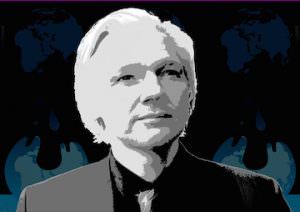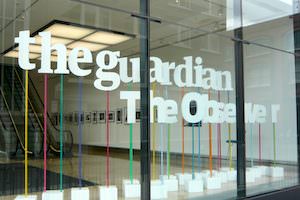Guardian Editor Discusses Snowden Leaks and a Security State Run Amok
In an essay in The New York Review of Books, Alan Rusbridger takes a long view of the efforts of government security apparatuses to bug our daily existences, including subverting online security, to make us safer. So, do you feel any safer?
Alan Rusbridger, the editor of Britain’s Guardian newspaper, has an essay in the new issue of The New York Review of Books that stands out as a reasoned explanation of the role The Guardian has played in bringing Edward Snowden’s revelations to light, and why the full-throttle pursuit of data by governmental security apparatuses is an affront to individual freedoms.
In England, Rusbridger writes, the official reaction to the details was a delayed visit by government agents to The Guardian’s offices, and the forced destruction of the computers that held Snowden’s information (it involved drills and an angle grinder). In the U.S., there were no overt moves against the media that published the leaked material — thank you, embattled First Amendment — but Snowden himself was criminalized, and charged under a nearly century-old law espionage law. In a broader crackdown against leaks, though, the U.S. government has moved against individual journalists, including indicting the Anonymous-connected Barrett Brown (and his mother) over a link he included in a blog post, and seeking to force author and New York Times journalist James Risen to reveal sources for his 2006 book, “State of War,” which detailed Clinton administration efforts through the CIA to sabotage Iranian nuclear research.
In the Snowden leaks, rather than back down in the face of government suppression (Rusbridger talks about those efforts here), The Guardian continues to publish details on how the U.S. and British security agencies work. As do such U.S. outlets as ProPublica and The New York Times, shielded from the drill and angle grinder by the First Amendment, however long that might last under governmental efforts to define what makes a journalist, and a judicial system that is barely recognizable as an independent arbiter of legal interpretation (corporations are people; how Orwellian can you get?).
Rusbridger takes a step back in his essay for a longer view beyond the outrage of individual revelations of a security apparatus run amok. He paints a disquieting scenario of what our governments are doing to us, all in our own best interests, of course. Although the revelations have outraged countless people concerned about government overreaching, the spying has been shrugged off by many as inconsequential, and the complaints of civil libertarians dismissed as paranoia. He writes:
What’s gradually being revealed is that in the last ten or so years the US and UK governments, working in close collaboration, have been seeking to put entire populations under some form of surveillance. The apparent aim is to be able to collect and store “all the signals all the time”—that means all digital life, including Internet searches and all the phone calls, texts, and e-mails we make and send each other.
Some of it is data, some of it is so-called metadata—information about who sent a communication to whom, from where to where, not about specific contents. But as Stewart Baker, the former general counsel of the NSA, said in a recent discussion in New York, these are tricky distinctions. “Metadata absolutely tells you everything about somebody’s life,” he said with admirable candor. “If you have enough metadata you don’t really need content…. [It’s] sort of embarrassing how predictable we are as human beings.”
We have begun to glimpse how it’s all being done. The NSA and its British counterpart, GCHQ (Government Communication Headquarters), work closely with Internet service providers and telecom companies to amass enormous quantities of data on us. Some of it is done through the front door—formal legal requests. Some of it is done “upstream” of tech companies and phone companies—i.e., intercepting signals in transit. The agencies have attached probes to transatlantic cables, enabling them to vacuum up data on millions of users on both sides of the Atlantic. By last year GCHQ was handling 600 million “telephone events” each day, had tapped more than two hundred fiber optic cables, and was able to process data from at least forty-six of them at a time.
We have also learned about how the agencies have spent vast sums of money on subverting the integrity of the Internet itself—weakening its overall security in ways that ought to concern every individual, public body, or company that uses it. A trapdoor that lets the NSA into your messages is, most cryptologists agree, quite exploitable by others. If you’re anxious about your bank details or medical records sitting online, you’re probably right to be.
Eerily, somewhere some apparatus is noting whether you decide to share this item on a social media outlet or text a link to a sympathetic friend.
Such relaying of information isn’t illegal, and there is no defensible reason in the world for government security apparatuses to be vacuuming up these interactions. Yet they do, often extra-legally. And often with a wink and a nod from Internet providers. According to Rusbridger:
As the Snowden revelations proceeded it became apparent how reliant the security services actually are on the commercial services we all use—the Internet service providers, phone companies, and social networks—for help, both official and unofficial. Both in the US and in the UK the cloak of legal secrecy that surrounds this activity is such that no company dares come out openly and discuss its relations with the secret services. It is illegal to do so. For their part, governments on both sides of the Atlantic are terrified that commercial companies will “run for the hills” if consumers learn quite how accommodating they have been with their data.
But I did have an interesting (unattributable, of course) briefing from someone very senior in one West Coast mega-corporation who conceded that neither he nor the CEO of his company had security clearance to know what arrangements his own organization had reached with the US government. “So, it’s like a company within a company?” I asked. He waved his hand dismissively: “I know the guy, I trust him.”
There is quite a lot of trust involved in the world on which Edward Snowden has pulled back the curtain. Anyone using this particular company’s services has to trust a nameless man (not the CEO) to have a relationship of integrity with his government (which may not be the customer’s own government). Other documents we have seen say that some telecom companies go “well beyond” what they’re legally required to do.
All of which raises the troubling question, where exactly is the line between paranoia and the reality of the security state?
—Posted by Scott Martelle.
Your support matters…Independent journalism is under threat and overshadowed by heavily funded mainstream media.
You can help level the playing field. Become a member.
Your tax-deductible contribution keeps us digging beneath the headlines to give you thought-provoking, investigative reporting and analysis that unearths what's really happening- without compromise.
Give today to support our courageous, independent journalists.






You need to be a supporter to comment.
There are currently no responses to this article.
Be the first to respond.